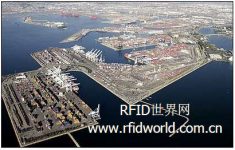
San Pedro Bay uses RFID tags to implement port air cleaning program
[ad_1]
Thanks to RFID technology, the air at the two ports of Los Angeles and Long Beach in the United States will soon become cleaner. Last year, the two ports launched the San Pedro Bay Port Clean Air Plan, with the goal of limiting the port’s air pollution and greenhouse gases and reducing the risks of air pollution to human health. A branch of the plan, the “Environmental Truck Project”, will use RFID tags to identify trucks entering the port and charge a certain fee for vehicles that exceed the minimum emission standards.

The two ports, together with the South Coast Air Quality Control Zone, the California Air Resources Board, and the U.S. Environmental Protection Agency, jointly launched the San Pedro Bay Port Clean Air Plan. The goal is to reduce truck-related air pollution by 80% by 2012 and within the next 5 years Reduce at least 47% of the particulate pollution produced by all relevant resources in the port, and at least 45% of nitrogen oxides and 52% of sulfur oxides from smog. In order to achieve this goal, project participants used funds to sponsor new or refurbished clean-emission vehicles, and strive to reduce the number of old diesel trucks at the San Pedro Bay Freight Terminal within 5 years.
As early as 2005, in order to strengthen port security and prevent traffic jams, the two ports had launched a project PierPass. Therefore, many trucks leading from the port have adopted the RFID tags required by the environmentally friendly truck project. In order to use the original RFID facilities, the shipping operator established another agency, PortCheck, to use the RFID tags of the PierPass project.
In addition to charging fees based on the usage time and emissions of truck engines, PortCheck will also prohibit the production of trucks before 1989 (unless they are replaced with new engines). Trucks with diesel or other fuel engines produced in 2007 or later are exempt from the charge because they are the cleanest burning of all trucks.
So far, Wargo stated that since the implementation of the PierPass project, approximately 27,000 RFID tags have been issued to vehicles passing through the port.
PierPass first adopted the 2.4 GHz WhereTag III tag produced by WhereNet. WhereTag III adopts ANSI 371.1 compliance
Time positioning system standard air protocol. Now PierPass has switched to the WhereTag IV tag, which still operates at 2.4 GHz, but uses an air interface protocol that complies with ISO 24730-2 RTLS and IEEE 802.11b Wi-Fi standards. The original WhereNet reader in the port and the newly installed reader in the environmental truck project can read WhereTag III or IV tags at the same time.
In addition to the installation of hardware equipment, PortCheck mainly needs to establish automated vehicle identification and charging procedures. In order to complete the identification and charging process, PortCheck partnered with eModal, a database management company in the transportation industry. eModal uses a SQL database to store the ID code of the vehicle tag, truck license, driver information, production time and type of vehicle engine.
On November 10th, the PortCheck electronic gate reader system will be officially launched. At that time, container operators will reject trucks that lack RFID tags. Starting from November 17, the collection of fees for the environmentally friendly truck project will be launched at the two ports at the same time.
[ad_2]



